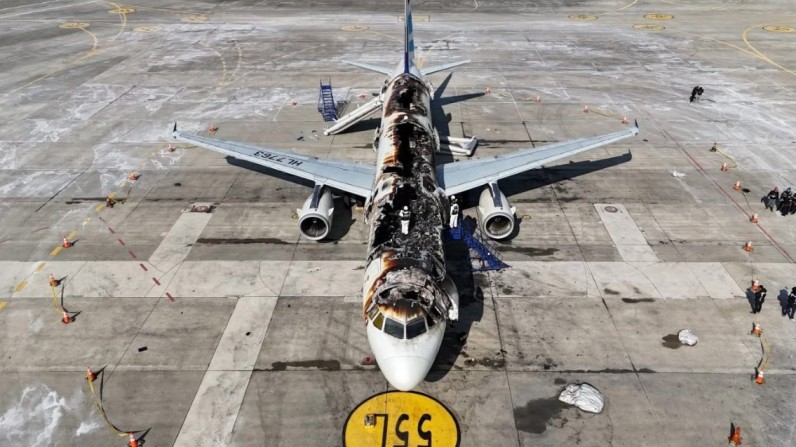
South Korean airline Air Busan has implemented a new rule prohibiting passengers from storing power banks in overhead bins.
The decision follows a fire on January 28, when an Airbus A321 preparing for departure at Gimhae International Airport caught fire, injuring seven people and forcing the evacuation of 176 passengers and crew. Authorities suspect a lithium battery in an overhead bin caused the incident.
Going forward, passengers must keep power banks with them in their seats so any overheating or fire can be detected and handled immediately.
Carry-on luggage will now be inspected at boarding gates, and only bags without power banks will be tagged and allowed in the overhead compartments. Air Busan called this a "pre-emptive measure" to improve safety and prevent similar incidents.
A government investigation is underway to confirm the fire's exact cause, but local media reports suggest a power bank was to blame.
According to Forbes, lithium batteries are known for their potential fire risks, as studies have shown they can undergo "thermal runaway"—a dangerous and uncontrollable rise in temperature that releases flammable gases.
The Federal Aviation Administration (FAA) recorded 81 lithium-battery incidents in 2024 alone, averaging 1.6 incidents per week.
Experts Divided on Air Busan's Power Bank Ban After Jet Fire
Aviation safety experts have differing opinions on Air Busan's decision. Warren Chim Wing-nin, deputy chairman of the Hong Kong Institution of Engineers' aircraft division, acknowledged that banning power banks in overhead bins could reduce fire risks but called it "more restrictive than existing international practice."
He noted that further risk assessments by organizations like the International Air Transport Association (IATA) would determine if the rule should be expanded to other airlines.
On the other hand, retired engineering professor Lo Kok-keung supported stricter measures, BangkokPost said.
He stated that passengers should ensure their power banks are in good condition and avoid using them during flights to minimize risks.
According to current aviation regulations, lithium batteries are prohibited in checked baggage but are allowed in carry-ons with restrictions.
Airlines like Cathay Pacific and HK Express allow passengers to carry up to 20 spare batteries under 100 watt-hours, while higher-capacity batteries are limited. All batteries must be individually protected to prevent short circuits.
The International Civil Aviation Organization (ICAO) requires a preliminary report on the Air Busan fire within 30 days, with a final investigation report due within a year. Any further safety recommendations will be outlined in the final report.
Meanwhile, Air Busan's new rule will initially apply to trial routes starting Friday before expanding to all flights.







Join the Conversation